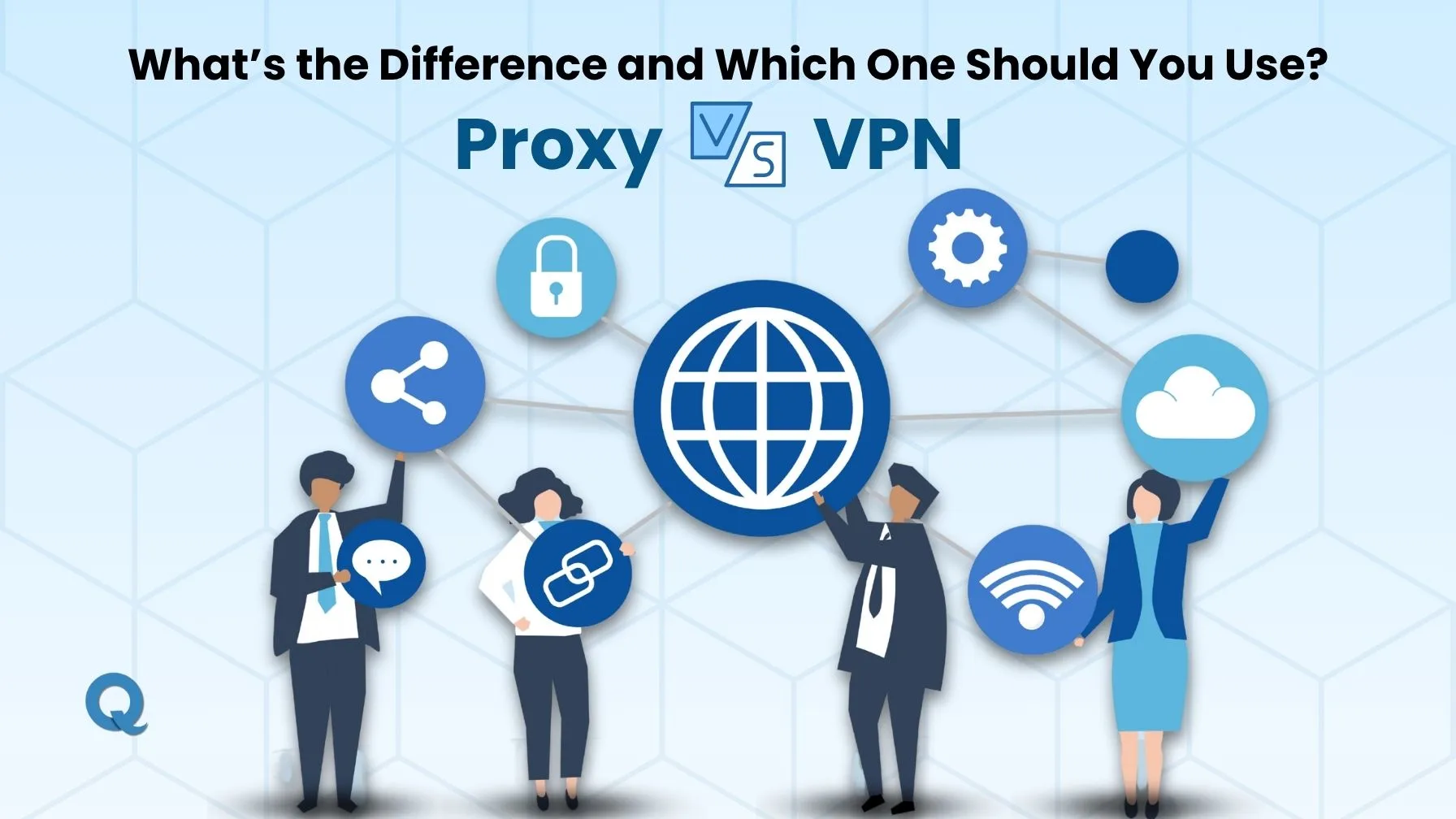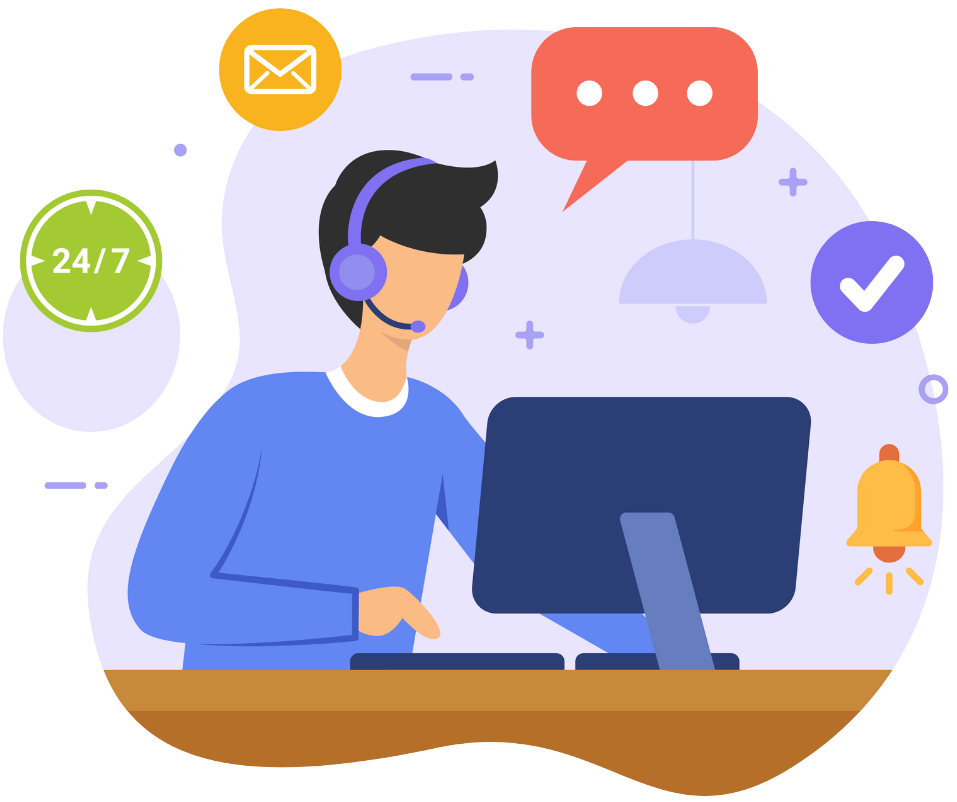Proxy vs VPN: What’s the Difference and Which One Should You Use?
Learn how each protects your privacy, boosts security, and fits your needs. Find the best choice for safe, fast internet use.
Author: Siva Sai
Learn how each protects your privacy, boosts security, and fits your needs. Find the best choice for safe, fast internet use.
Author: Siva Sai

When you use the internet, your personal data can end up in the wrong hands. This is a big risk when you connect to public Wi-Fi or networks that are not secure. Last year, a study found that 40% individuals had their information compromised while using public Wi-Fi.
VPNs and proxies both protect your privacy, but they work in different ways. Picking the right one helps keep your information safe without slowing your connection or making you pay for features you don’t need.
This guide will explain how VPNs and proxies work. It will help you choose the best one that suits your needs.
A proxy is like a middleman between your device and the internet. Instead of you directly connecting to a website, your request first goes through the proxy server. Then the proxy sends that request to the website and returns the result to you.
Think of it like asking a friend to search something online for you. The website only sees your friend’s request, not yours - your identity stays hidden in the background. There are different types of proxies, some help you hide your IP address, some help you access blocked websites, and others are used by companies to control what their employees can access online.
But most proxies don’t encrypt your data. So even though your IP address is hidden, your actual internet activity can still be tracked by ISPs or hackers, especially on public Wi-Fi. That’s why proxies are great for basic tasks like bypassing website restrictions but not ideal for privacy or security.
A VPN (Virtual Private Network) takes things a step further. Just like a proxy, it hides your IP address by routing your traffic through another server. But unlike most proxies, a VPN encrypts all your data, meaning nobody can see what you're doing online, not even your internet provider.
Imagine you're in a crowded room using public Wi-Fi. A VPN is like building a private tunnel from your device straight to the internet, nobody outside the tunnel can peek at what you're doing. You can use a VPN to stay private, protect your data on public networks, and even access content that’s restricted in your region. It’s commonly used for both personal safety and professional privacy.
With just one click, all your apps and browsers get protected at once. So if privacy and security really matter to you, VPNs are the way to go.

While both VPNs and proxies serve the purpose of masking your online activity, they do so in different ways. Understanding the key differences between proxy vs vpn will help you choose the right tool based on your needs for privacy, security, and performance.
Refer to this table for better understanding.
| Feature | VPN | Proxy |
|---|---|---|
| Security | Encrypts all traffic, providing high protection | No encryption, lower security |
| Privacy | Fully masks IP and encrypts data | Only masks IP, does not encrypt data |
| Security | Encrypts all traffic, providing high protection | No encryption, lower security |
| Best Use | Secure browsing, accessing sensitive data, remote work | Accessing blocked content, streaming, web scraping |
| Cost | Typically paid, with free limited options | Often free, but comes with risks |
Both VPNs and proxies serve different purposes depending on your needs. Below is a breakdown of when each is best used based on your requirements.
VPNs are ideal when security, privacy, and data protection matter most. These are some situations where a VPN proves to be beneficial:
Public Wi-Fi networks in places like coffee shops, airports, or hotels are vulnerable to hackers who can easily intercept your data. A VPN encrypts your connection, ensuring your sensitive information, like passwords or personal files, and even your activity on online shopping apps, remains secure and out of reach from unauthorized access.
If you're trying to access websites or services that are restricted in your region (like streaming services), a VPN bypasses geographic restrictions, letting you access the content you want from anywhere in the world.
For online shopping, banking, or browsing, a VPN keeps your activities private. By securing your connection, it protects your browsing history, purchases, and transactions from anyone attempting to monitor or intercept your data.
If you’re concerned about your online activities being tracked by advertisers, websites, or even governments, a VPN masks your IP address, making it much harder for them to follow your browsing behavior and collect personal information about you.
Proxies are a more lightweight solution compared to VPNs and are better suited for tasks where security isn't the top priority.
For faster browsing, proxies are a solid choice. They offer quicker speeds compared to VPNs. If you're looking to browse or stream without focusing too much on security, a proxy provides a faster and more efficient solution.
Proxies are useful for businesses or individuals who need to collect data from websites without causing disruptions. If you’re gathering large amounts of data or using web scraping tools to automate tasks, proxies allow you to make multiple requests to a site without getting blocked.
If you're trying to access services or websites that certainly block an IP address of your country, a proxy can provide the solution. By masking your real IP address, it lets you bypass these limitations and access the content or services you need, without facing any barriers.
Proxy servers provide a basic level of privacy when you’re performing non-sensitive tasks. If you're browsing the internet or watching videos and simply want to avoid location-based ads, a proxy can be a suitable choice.
Choosing the right security solution depends on your needs. Whether for kids, business, or personal use, knowing the options helps you make the best choice.
When it comes to kids and young users, safety online is always a priority. Kids are naturally more curious and, at times, less cautious about their online activities.
A VPN can offer them a layer of protection that helps keep their personal data private. By encrypting all their online traffic, a VPN ensures that hackers or third parties can’t easily access their browsing habits or login information.
In addition to protecting sensitive data, a VPN can block harmful content, helping prevent kids from stumbling upon inappropriate websites or content.
For businesses, maintaining data security is non-negotiable, and a VPN plays a key role in protecting sensitive information. Many companies today have remote teams or employees who work from different locations, meaning that data is often transmitted over public networks.
A VPN creates a secure, encrypted tunnel for this data, ensuring that it cannot be intercepted by hackers or other malicious entities. This is especially important when dealing with confidential client information, financial records, or intellectual property.
A good VPN will help businesses comply with data protection regulations, which is vital in industries like healthcare or finance where data breaches can result in heavy penalties. The security and protection a VPN provides for your business data is essential.
If you're simply browsing or trying to access content that's blocked in your region, a proxy can be just what you need. It's quick and easy to set up, and it hides your IP address, giving you a basic level of privacy. Proxies are great for things like watching geo-blocked videos or visiting restricted websites. With minimal effort, you can bypass restrictions and enjoy more freedom online.
To wrap up, both proxies and VPNs offer ways to protect your online presence, but each serves a unique purpose:
Proxies are ideal for bypassing geo-blocked content and quickly accessing restricted websites, without the need for encryption.
VPNs, however, provide robust security and privacy, making them the best option for users who need to protect sensitive information, especially when using public networks or engaging in high-risk activities.
If privacy and security are your main concerns, a VPN is your best bet. But if you’re mainly looking to access blocked content with speed, a proxy will do the job.